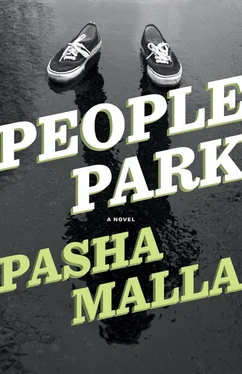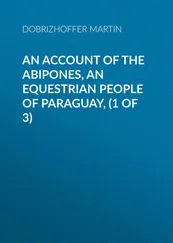This comprised hastily spliced-together We-TV footage of the previous night’s festivities, and began with monologues performed in garages and bedrooms around the island, from the Mews to Fort Stone, the popular acumen of the masses, all those predictions and insights edited into one rambling overture that echoed and contradicted and befuddled itself before things cut to a happy Li’l Browntown family painting wings on one another’s faces and chanting Ra- ven on their driveway.
Cut to a disembodied voice narrating tremulous handheld footage of the crowds descending into the park, hundreds of napes of necks and backs of knees with the view sometimes flashing skyward where sunspots seared the lens. A new voice took over, someone else shooting the opposite end of the park. All of this was set to a jaunty carnivalesque score, the time flashing at oddly progressing intervals: 13:40, 14:10 , etc.
The daylight began to deepen. An extended segment featured a surprisingly well-researched and thorough tour of the Museum of Prosperity, right up to the top floor, and here was Adine’s Sand City, and seeing it she felt a slight pang of — what? Something proprietary, violation, shame, yet beneath it an ember of pride. With the camera zooming in on her model it seemed unreal, or too real, the miniature buildings expanded to the size of actual buildings. Feeling overwhelmed, Adine’s thoughts retreated into memories — of Debbie. Debbie who had once cranked a song on the radio, claiming it was theirs , and Adine had run to the bathroom and pretended to barf. But if anything was theirs it was the Sand City. Visiting the Museum’s top floor had become the thing to do when there was nothing to do, they’d Yellowline over and Redline up and wave at the girls working ticketsales and climb the tower and there it was, under glass.
They’d tell each other stories then. When they ran out of stories they’d make some up: What if Isa Lanyess was actually sent here from some other planet to jellify our minds so she could plant her eggs into them and then all our heads would hatch millions of little space-alien babies? Adine suggested once. What if Lucal Wagstaffe’s a secret vegetarian? countered Debbie. Adine had a key that locked the door, if she needed to. And sometimes Debbie would fix her with a sidelong lingering look, and she did.
Though these thoughts sparked irritation. The model wasn’t Debbie’s, it wasn’t theirs — it was hers, Adine’s, only Adine’s. Debbie was an interloper. She had so much else, all her friends and causes, her stupid cumin-drenched dinners and community . She shouldn’t get to possess or even share the thing Adine had created before they’d met.
Debbie was the one responsible for its display now on the bigscreen — this violation, this corruption. Of course the public could visit the Sand City whenever they wanted, and that was bad enough, but simultaneously seen by so many people like this, with its creator reduced to another set of ogling eyes, felt cheap and humiliating.
But then the image dissolved: from the roof of the boathouse someone made wide sweeping pans of the mobbed park, which became a montage, one image flashed to the next, until the moment the Zone’s power had cut out. All the westenders who’d missed the illustration edged forward in their seats. The tubby little superfan, Gip Poole, was brought onstage. The crowd went wild, the trunk opened, Raven got inside, the boy locked him in. Cut to one of those massive screens that flanked the gazebo, footage of the footage of Guardian Bridge, and the lights went out and came back on and the bridge was gone, and everyone in Cinecity gasped, even those not seeing it for the first time.
Cue fireworks.
Fade to black.
Credits.
The End.
And now this preamble to the main event, All in Together Now , the movie for the people by the people: a camera trolling the streets of downtown. South on Paper Street, out of downtown to Lakeside Drive, down to the shoreline, nosing out of the mist with the curiosity of a stage manager scoping the crowd between parted curtains. If this made the water an auditorium, there was no audience. The view was clear: no fog, no people, just the crimped steel of the lake all the way to the horizon.
Little flashes pocked the water where waves flared into whitecaps. Otherwise it and sky were the same brooding grey, clouds too sullen to storm. No one was out boating or swimming. There was something soothing about the quiet chaos of the lake, undisturbed by human beings, wave after wave slicing up and frothing and dying. Adine watched. Everything was quiet. A pall had fallen over the theatre, silent and serene.

IN THE TEMPLE’S basement, upon their respective wheeled devices at either end of a conference table piled with breakfast flats, trembled Favours, drool snaking down his chin, and the Mayor, whom a re-ducktaped Diamond-Wood had pushed right up to the table to conceal her lower half. To Favours’ left were the High Gregories (Griggs, Wagstaffe, Magurk, Noodles), and to his right, the L2’s (Bean, Walters, Reed). In the corner, with the guilty, squirming silence of two soot-smeared arsonists awaiting trial, on stools perched Starx and, like a child in his father’s clothes, Olpert Bailie.
The air was thick with that stale cornchip odour that men exude in basements. Into the musty silence came a thumping sound from the other side of the wall, followed by faint chirps — someone crying?
Big fella, said Magurk, beckoning to Starx. Come with me for a sec.
Starx stood, bowed, and followed the Special Professor out of the room.
The Mayor spoke: Where is the magician.
Illustrationist, corrected Wagstaffe.
We have no idea, said Griggs.
No idea? said the Mayor. Not the answer I was looking for. He’s just gone, poof, like the — like the fuggin bridge?
To be fair, Mrs. Mayor, said Griggs, Raven never told us how things were going to work, just his basic schedule. Our job was largely site logistics.
The Mayor opened her mouth to speak, but was interrupted by growling from the other side of the wall — then a dull whumping sound and Magurk’s pennywhistle voice shrieking, You like that, fatty? There was a pause, an exchange of words — Olpert thought he heard Starx say, He’s all right — a slap, another whump, and Magurk was back with Starx trailing after him, looking dismayed.
Magurk reassumed his place among the HG’s: Sorry about that, me and the big fella here got things under control. Isn’t that right, big fella?
Starx sucked his teeth.
So, continued the Mayor, despite shutting down the north shore to traffic, you didn’t know the bridge was going to disappear. Nor did you have any idea that he’d disappear. And now — you’re as lost as me.
Yes, said Griggs.
You pretty much nailed it right there, said Wagstaffe, beaming.
But your men were watching him! They didn’t notice anything? Did they help him escape? Did the stage have trapdoors?
He doesn’t use trapdoors, muttered Starx.
Helpers don’t speak until told, said Magurk. Do we have to get the ducktape?
The Mayor eyed Magurk as if he were a slug she’d found in her salad, then spoke to Griggs: Who were the men in charge of Raven?
Him, Starx, said Griggs, pointing. And the redhead — Bailie.
Hi, said Olpert.
Raven works alone, said Starx, and we weren’t ever privy —
Both of you! screamed Magurk. Silentium!
I don’t care who talks, said the Mayor. I just want to know what’s going on.
Everyone looked around the room at everyone else, but no one said anything.
Wagstaffe chuckled. Maybe it really was magic?
Читать дальше













